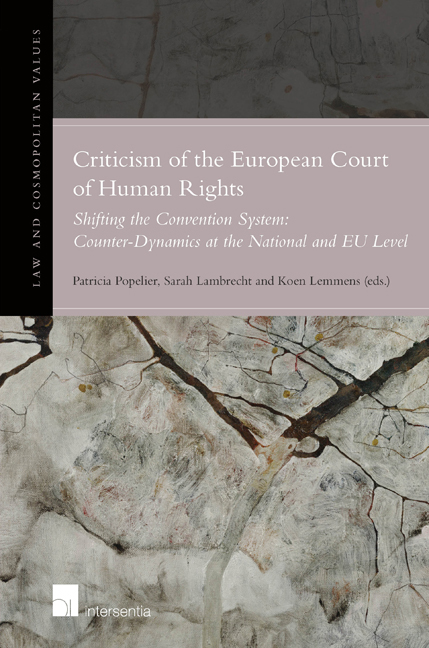 Criticism of the European Court of Human Rights
Criticism of the European Court of Human Rights Book contents
- Frontmatter
- Contents
- List of Abbreviations
- PART I INTRODUCTORY
- PART II SPARSE CRITICISM
- PART III MODERATE CRITICISM
- Chapter 11 France: “Jet'aime, moi non plus”
- Chapter 12 Hungary: ‘Gains and Losses'. Changing the Relationship with the European Court of Human Rights
- Chapter 13 The Netherlands: Political Dynamics, Institutional Robustness
- Chapter 14 Norway: New Constitutionalism, New Counter-Dynamics?
- Chapter 15 Switzerland: The Substitute Constitution in Times of Popular Dissent
- Chapter 16 Turkey: The European Convention on Human Rights as a Tool for Modernisation
- PART IV STRONG CRITICISM
- PART V HOSTILE CRITICISM
- PART VI SYNTHESIS
- APPENDIX
Chapter 11 - France: “Jet'aime, moi non plus”
from PART III - MODERATE CRITICISM
Published online by Cambridge University Press: 13 December 2017
- Frontmatter
- Contents
- List of Abbreviations
- PART I INTRODUCTORY
- PART II SPARSE CRITICISM
- PART III MODERATE CRITICISM
- Chapter 11 France: “Jet'aime, moi non plus”
- Chapter 12 Hungary: ‘Gains and Losses'. Changing the Relationship with the European Court of Human Rights
- Chapter 13 The Netherlands: Political Dynamics, Institutional Robustness
- Chapter 14 Norway: New Constitutionalism, New Counter-Dynamics?
- Chapter 15 Switzerland: The Substitute Constitution in Times of Popular Dissent
- Chapter 16 Turkey: The European Convention on Human Rights as a Tool for Modernisation
- PART IV STRONG CRITICISM
- PART V HOSTILE CRITICISM
- PART VI SYNTHESIS
- APPENDIX
Summary
CRITICISM OF THE EUROPEAN COURT OF HUMAN RIGHTS
The subtitle of this report, Je t'aime, moi non plus (I love you, me neither), is a reference to a famous song written by Serge Gainsbourg and sung as a duet with Jane Birkin, as well as to an article published by Professor Simon about the relationships between European courts, the Court of Justice of the European Union and the European Court of Human Rights. In our opinion, the poet's evocation of thwarted love provides an apt summary of the relationships that France maintains with the European Court of Human Rights.
Before beginning this short study, however, we should provide a brief definition of the notion of criticism. As is the case with any notion, criticism can be interpreted in several different ways. It can have a negative connotation, questioning the work of the European Court of Human Rights. On the other hand, it can be interpreted more positively as questioning the work without any attempt to dispute it. These two interpretations do not conflict with each other. Instead, they are complementary. Whereas an interrogation without premise can lead to radical questioning of a jurisdictional work, a negative premise can gradually transform into a comprehensive attitude of the Court's case law. Another point should be stressed as well. Criticism expresses a particular degree of knowledge, intermediating between the speaker (in this case, the European Court of Human Rights) and the party receiving the expression (in this case, the citizens/applicants). From this point, the criticism can interfere in this speech and possibly to disrupt it. It is therefore advisable to measure these effects.
This report thus constitutes a ‘criticism of the criticism’. In this context, the criticism becomes institutional, as it questions the meaning of what is being criticised, in addition to questioning those who are criticising it.
The relationships between France and the Council of Europe, and especially the mechanism of the European Convention on Human Rights and Fundamental Freedoms (hereinafter, the ECHR) and its judges are complex, and even ambiguous.
- Type
- Chapter
- Information
- Criticism of the European Court of Human RightsShifting the Convention System: Counter-dynamics at the National and EU Level, pp. 269 - 294Publisher: IntersentiaPrint publication year: 2016
